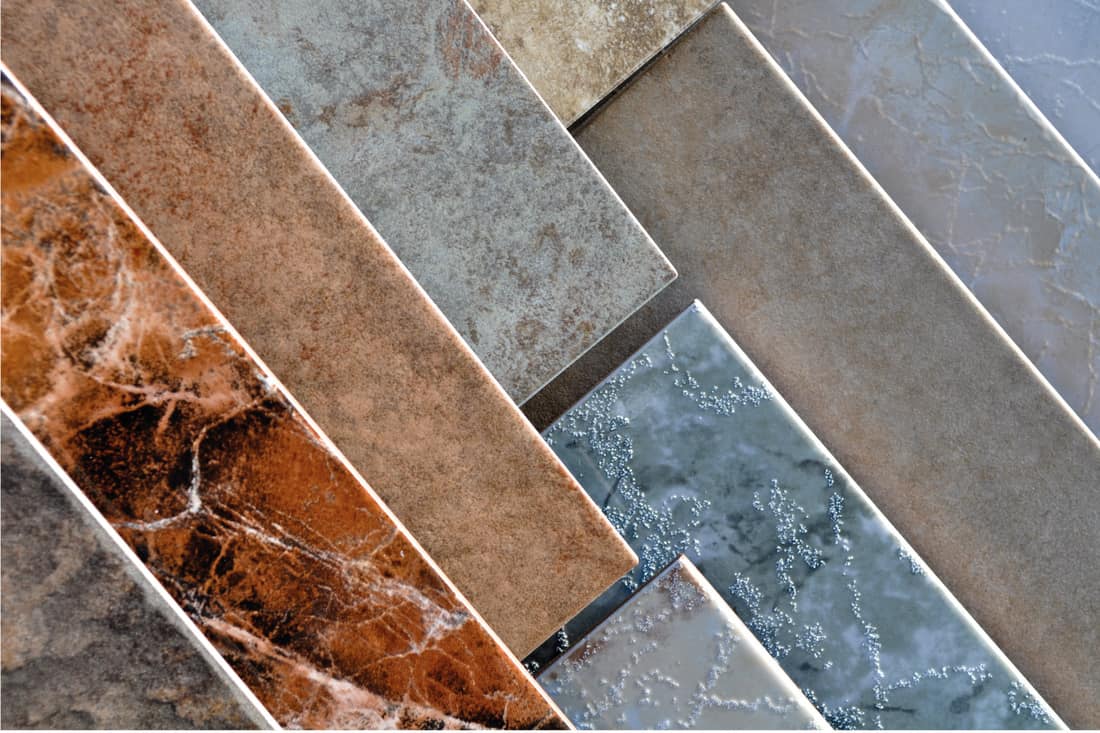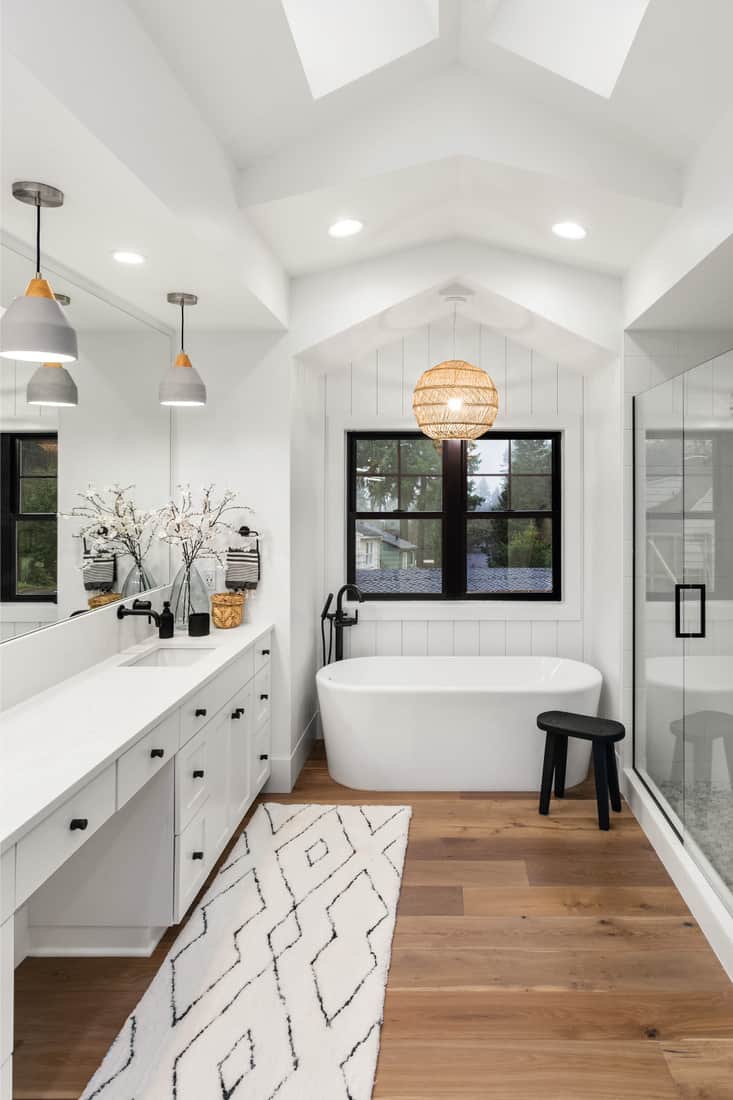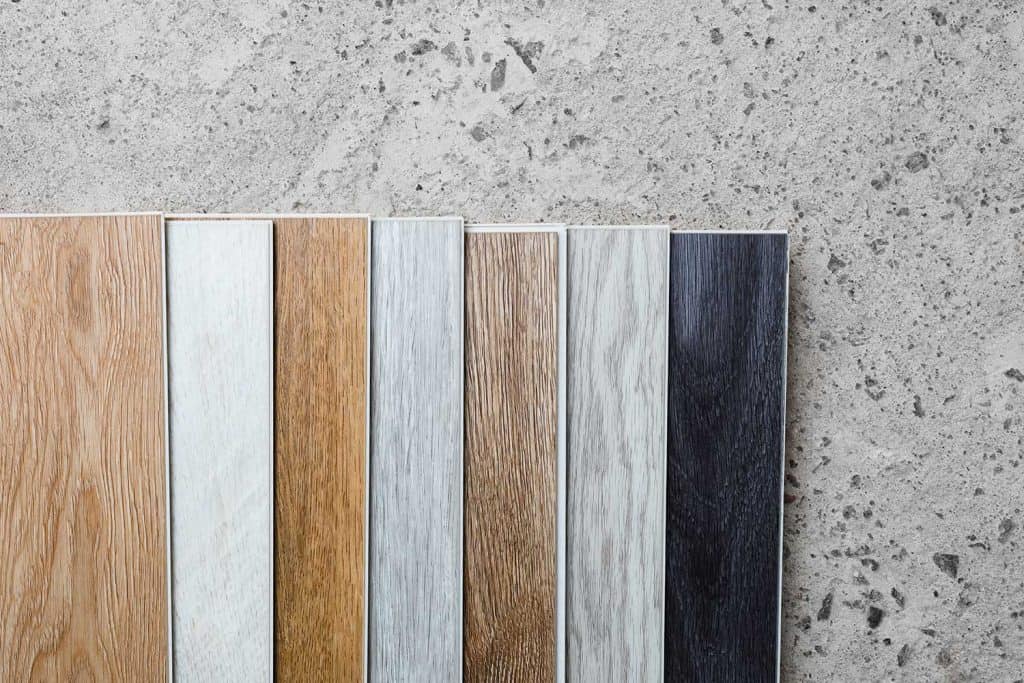If you’re trying to decide on the best flooring for your bathroom, we’re here to help! We’ve researched extensively different bathroom flooring options, so you will have all you need to know in one place.
The best flooring for bathrooms is:
- Porcelain or Ceramic Tile
- Waterproof Vinyl
- Natural Stone
- Engineered Wood
We’ve given you a list of the best flooring for your bathroom, but what makes each one great? Keep reading as we go into detail with each one’s pros and cons, the average cost, and the different styles available. We’ll also cover some other questions you might have about your bathroom floor!
The Best Bathroom Flooring Options
So, what makes a type of flooring good for a bathroom? Well, the main requirement is that it is waterproof. Choosing flooring that isn’t waterproof can cause you some major headaches in the future. If water gets beneath your flooring, it can cause major damage to your substructure. You’ll also want to choose a flooring that is not chipped or cracked easily. What makes flooring good for you might also include how much it costs and what styles to go with your overall design.
If you’re only looking for half of the bathroom floor, that doesn’t include a bath or shower, you can choose some less waterproof flooring because there is less risk of water being on the floor.
1. Porcelain or Ceramic Tile

If you’ve seen tile in a bathroom, it is likely either ceramic or porcelain. Both work well in bathrooms because they are waterproof, durable, and easy to clean. Porcelain is a type of ceramic tile, but it is made slightly differently. Both are made from clay, but porcelain is fired at a higher temperature than ceramic making it denser; because it is denser, it is also harder to cut, so we recommended leaving porcelain tile installation up to the professionals.
Though both options are waterproof, because of the way it is made, porcelain absorbs water at a slower rate than ceramic tile making it more waterproof and therefore more ideal than ceramic for a bathroom. Tile will also be colder to walk on than waterproof vinyl or engineered wood flooring, so you may need to add some warmer bathroom rugs to your room!
Click here to see Diflart white subway porcelain floor and wall tile on Amazon.
Cost
As it is of better quality than ceramic, porcelain has a higher price tag. It will cost you $9.50 per sq ft on average whereas ceramic will cost you about $5 per sq ft. If you aren’t planning on installing the tile yourself, keep in mind that porcelain can sometimes have a higher labor cost as is it more difficult to cut than ceramic.
Durability
As we briefly mentioned above, porcelain tile is more durable than ceramic. This means it is also less likely to chip than ceramic, especially if you choose an unglazed tile.
However, they are both great choices for bathroom flooring, come in a variety of patterns and styles, and both will get the job done, so if your budget doesn’t allow you to splurge on porcelain tile or if you want to choose the most DIY friendly option, don’t be afraid to choose ceramic.
2. Waterproof Vinyl

One of the most affordable options for bathroom flooring is waterproof vinyl. Waterproof vinyl is a synthetic material comprised of PVC chips. It has been used for bathroom flooring for years and is available in large sheets or in tiles. It is also one of the easiest floorings to install, making it a great option for DIY’ers.
There are hundreds of design options available, so you’ll be sure to find a design that’ll fit the look you want. There are definitely more pros than cons when it comes to vinyl, but one con to consider is that it can affect your home’s resale value since it is one of the less luxurious flooring choices.
Waterproof sheet vinyl is also popular because it is so easy to clean! Who wouldn’t enjoy not having to scrub between the tiles? Just take a mop to the surface, and you’ll be done in no time.
Click here to see luxury vinyl planks on Amazon.
Cost
Depending on the vinyl type, you can expect to pay from $2 to $14 per sq ft. Luxury waterproof vinyl is the best option to choose for your bathroom, so consider splurging a little more for better quality.
Durability
Vinyl is very durable, however, it can be punctured easily. This shouldn’t be too much of a concern in your bathroom though, and is more of a problem in a kitchen where knives and other sharp objects might be dropped. So, for the most part, vinyl can withstand heavy traffic and is easy to clean.
3. Natural Stone

Choosing natural stone for your bathroom floors is truly extravagant. Due to its uniqueness and the extensive labor process of making the tiles, it is a popular choice for those really wanting to make a statement. It is the most expensive bathroom flooring options. There are different natural stone tiles available, but limestone, marble, and granite are all very popular choices. One advantage of natural stone flooring is that it will increase your home’s resell value!
A few disadvantages of natural stone are that it is also naturally slippery, making it an unwise choice for the elderly or those with small children in the home.
Cost
Marble tile will cost you on average $9 to $24 per square ft, but depending on the stone you choose, it can cost you up to $100 to $300 per square ft. Keep in mind that there are plenty of porcelain and ceramic tiles that mimic the look of natural stone without the large price tag!
Durability
While natural stone is some of the most durable material you can use, a lot of maintenance is required for its upkeep. You’ll also need to make sure it is sealed with a waterproof sealant once installed because the stone can be very porous, and moisture can cause discoloration. Depending on the stone you use, stone tiles can be brittle, which means they might crack easily.
4. Engineered Wood

Regular hardwood is made of a solid piece of wood. Engineered hardwood is made up of thin layers of wood, each positioned differently and held together by wax and adhesive. Engineered hardwood is becoming a popular choice for bathrooms because it is water-resistant and shares the look of real hardwood. Because of its look, it can be installed in multiple rooms for design continuity throughout your home, and like vinyl, it is much easier to install than ceramic or porcelain tiles.
Click here to see engineered parquet hardwood flooring on Amazon.
Cost
Engineered wood flooring can range from $3 to $13 per square ft, but because it is pretty easy to install yourself, you’ll save on installation costs.
Durability
Engineered hardwood is long-lasting and durable. It is less susceptible to moisture damage than regular hardwood but can still warp if exposed to standing water for a long period of time. You’ll need to clean up any big leaks or spills pretty quickly to avoid any damage.
Flooring to Avoid
We’ve given you four flooring options that are great for the bathroom, but here’s a couple to avoid!
Carpet

It may seem obvious that you should avoid putting carpet in your bathroom. Though you might be tempted to use carpet for its warmth and feel under your feet, carpet is not a good option for your bathroom floor. It will hold and retain moisture, it is not easy to clean, and it stains and ruins easily.
Laminate Flooring

While a lot of laminate flooring is water-resistant, truly waterproof laminate flooring is yet to exist. Laminate flooring is sensitive to water, and if exposed to too much water, it can ripple and bubble. If this happens, you’ll have to replace all of the affected boards. For this reason, laminate flooring is not recommended for use in a bathroom.
What Is The Easiest Flooring To Install In A Bathroom?
We touched on it briefly above, but vinyl flooring is the easiest of floors to install and is a great choice for those wanting to redo their bathroom floors by themselves. Vinyl floors come in both sheets and tiles, and while both are known for their easy installation, vinyl sheets are the easiest to install because of their size. The vinyl sheet can be cut to the shape of the space very easily.
Engineered wood is also relatively DIY friendly flooring. The least easy flooring to install is tile and natural stone.
What Is The Most Popular Tile For Bathrooms?
Vinyl tiles are the most popular tiles for the bathroom because of their affordability and practicality followed closely by porcelain tiles for their lavish and luxurious appearance.
What Size Tile Looks Best In A Small Bathroom?

When you have a small room, you can rely on the power of illusion to trick the eye into thinking the room is bigger. Tile size can help change how big or small a room feels. This might seem confusing, but both larger and smaller tiles can actually make a small bathroom look bigger.
Bigger tiles can make the space feel more open because our brain equates bigger tiles with bigger spaces. A similar trick works with smaller tiles. Using smaller tiles tricks our brain into thinking the room must be bigger because of how many tiles can fit inside it. Here’s an extra tip for making the room seem bigger: use the same tile on the bottom portion of the wall to make it seem like the floor expands further than it actually does.
Should Bathroom Floor And Wall Tiles Match?
There are no rules that state your bathroom floor and wall tiles have to match. Can they? Sure, and there are many tile options available that will work on both your wall and floor, but there are also plenty of ways to decorate without matching them perfectly.
Same Color

In this modern bathroom, the floor and wall tiles share similar colors but are very different in style.
Contrast
In this bathroom, the tiles are different in shape and color, creating a dramatic contrast. More contrast is added by matching the shower fixtures with the floor tiles.
Add Color
You can even go bold and choose a bright-colored floor tile!
Don’t feel confined by thinking you have to match your wall and floor tiles.
Final Thoughts
We’ve given you four great options for bathroom flooring and two you should avoid. The best choice for affordability, practicality, and ease of installation is waterproof vinyl, but you should choose ceramic or porcelain tile for a more luxurious look. Both natural stone and engineered wood will run a higher price tag but will also increase the resale value of your home. We’ve given you lots to think about, but hopefully, it will all help you to decide on the best flooring for you!


